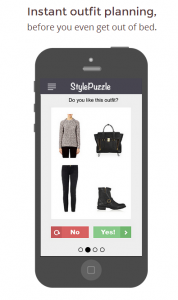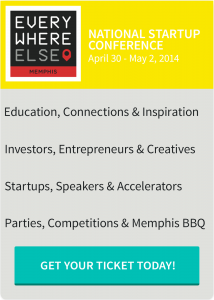 What’s the first thing you do when you open your eyes in the morning?
What’s the first thing you do when you open your eyes in the morning?
Most of you probably thought, “Grab my phone.” First thing in the mornings, our smartphones can tell us how many emails we missed overnight, what our friends on Twitter are up to, and the day’s weather.
If the folks at StylePuzzle have their way, it’ll soon help you figure out what to wear, too. The app, built by students from the University of Illinois, uses machine learning to take the clothes from your closet, occasions on your calendar, and the weather and finds you just the perfect outfit for the day.
Check out our Q&A with StylePuzzle below:
1) What’s your startup called?
StylePuzzle
2) What’s your big idea?
 We are building a mobile app that can instantly picks out daily outfits for users, tailored to their preferences, occasions, local weather, and latest fashion trend. We use machine learning and data mining techniques to teach the app how to style fashion pieces, based on users’ own clothes.
We are building a mobile app that can instantly picks out daily outfits for users, tailored to their preferences, occasions, local weather, and latest fashion trend. We use machine learning and data mining techniques to teach the app how to style fashion pieces, based on users’ own clothes.
3) What’s the story behind your idea?
Our initial idea about StylePuzzle was quite different from what we are doing now. We started off building a Q&A community of fashion for people to ask questions and get fashion advice or tips on what to wear to certain occasions and where to buy specific items. During our idea validation phase, we realized that most users indeed have the problem about what to wear, but waiting for an answer online for hours is somehow frustrating. While the Q&A idea was interesting, there was a bigger problem to tackle. Instant, relevant, and real fashionable outfit recommendations. So we wanted to solve the problem. We certainly feel there is a need for an app, and the community on Twitter seem to agree.
4) Who are the founders?
The app was primarily designed and built by 3 graduate students at University of Illinois Urbana Champaign. We are a student startup team with no experienced industry professionals, but fresh minds with superior level of expertise and a vision for future. Our team and idea have made finalists of many startup competitions, including the Student Startup Madness during SXSW.
5) Where are you located?
We are currently located in Illinois area, as we go to school here.
6) What’s the startup scene like there?
University of Illinois is a school with very rich history and culture of innovation. We’ve got a research park just outside of our campus, with many innovative tech companies as well as many student startups located there. There are many startup competitions hosted every year and many events happening as well. We were just selected as one of the 8 finalists of Student Startup Madness, and now we are busy preparing for it!
7) What milestones have you reached?
We just have the beta app ready and now we are having a private beta test. We have been receiving many positive feedback and valuable suggestions. Most of the private beta users are friends and people around us, and they have found the app very useful and addictive. Some of the quotes are:” I found myself looking at my phone first thing in the morning to decide what to wear, which is interesting.” and “Two common problems of ‘I have nothing to wear’ & ‘There’s no space in my closet’ solved with one app! Tech simplifies fashion!”
8) What are your next milestones?
Our next milestone is to publicly launch our app and get more users to try it out. At the moment StylePuzzle is still in private beta, and we are accepting signups. We just needed to ship a beta version to get some feedback and validation and to see what other features people would request.
9) Where can people find out more?
We are at http://stylepuzzle.com, on Twitter @StylePuzzle, and can be reached at info@stylepuzzle.com.



